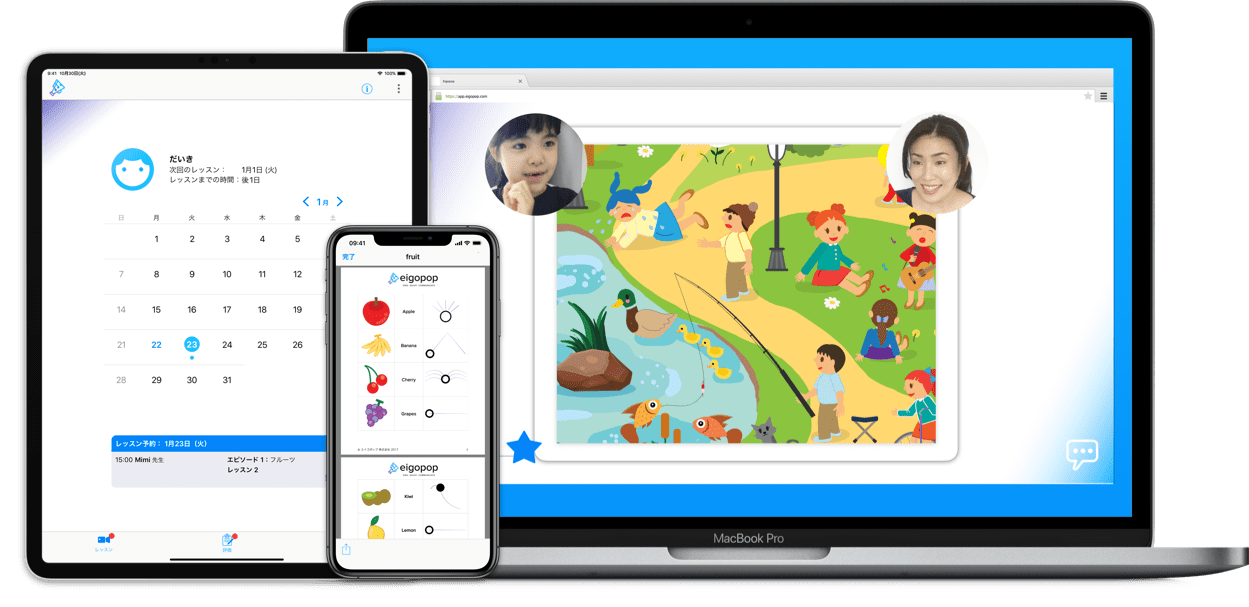What is Language Learning?

We believe that language learning is more beneficial when learning actively in a two-directional way. A case in point is a small child learning a native language. The native language is acquired by sound first. Sound and other sensory impressions are absorbed unconsciously.
This happens before learning any grammar and having a large pool of vocabulary to be memorized and evaluated. There are no theoretical roadblocks of correct or incorrect grammar. Just the pure need to communicate. The difference between passive and active learning.
When children learn a second language it’s not so much different. Yet when “studying” a new language, the mindset often gets changed from communication to comparative thinking. The brain gets trained to make twice the effort because the extra step of comparison is added.
Learning grammar, vocabulary, writing, and reading are an integral part of any language. For children, however, are these the primary parts to learn first? The need and motivation to communicate should come first. Other parts such as grammar, a depth of vocabulary along with reading and writing are easier to acquire when a language is already in one’s “ear”.
Learning Goals

There are certain challenges for learners of any language to truly be able to speak a foreign language. For Japanese learners of English those challenges might often be ingrained in the purpose as to why English should be learned.
Should English be learned because it is a common extracurricular topic, because it has become mandatory, or to help for school tests? I believe English should be learned because it is a highly effective and handy language. Being able to communicate in English has many benefits, many of which are closely related to adapting different mindsets, think objectively, express emotionally, and structure one’s thoughts in an effective way.
In some ways it is like being able to play an instrument-- it helps to develop pattern recognition and understand semantics; the inherent meaning of symbols such as words and other modes of expression. Acquiring those skills is undoubtedly not only helpful for different jobs but also to broaden one’s horizon.
Learning a language therefore is more than its vocabulary and grammar. Every language has a certain mindset, a cultural background and social codes that are reflected in it. We have seen, for example, that children often adapt a more open behavior and start to interact less inhibited with their environment when switching from Japanese to English. This is a sign of adapting a different mindset. The good thing, and one reason why English is so effective is that it can be relatively neutral. It lends itself to a wide range of applications and situations-- from small talk, to professional situations it is not tied to any racial group, culture, politics, or religion.
And that is why as a language it allows to develop different mindsets. English encourages to develop individuality and expression. Language is communication first.
Multiple Perspectives

Japanese
Compared to both English and German, Japanese is informed by group-oriented interaction. It allows for less hardline individual expression and generally values courtesy and politeness. The linguistic application is based on social context. Just like English Japanese is a more figurative language. Yet figurative speech in Japanese is to conform to social codes whereas figurative speech in English is used for individual expression.
German
Like English, German allows for a lot of individual expression. Compared to English however, German can come across as direct. German is a very objective language that doesn’t beat around the bush. It is a literal language that uses words exactly according to their meaning. German is emotionally colder compared to both English and Japanese. Like Japanese, German is informed by social context and differs between age groups and social settings.
English(British、American)
Compared to Japanese, individual thought is encouraged in the English language. That is why English is an emotionally expressive language. English is also a more figurative language that uses words outside of their definition. Spoken and even written English is usually a lot more casual on all social levels including friends, business, and between age differences. English puts direct expression before adhering to social codes.
English Language Learning Today

Historically, the main reason to learn English was to gain foreign knowledge, for trade and to stay competitive. When, during the Meiji Era, English was introduced as an integral part of language learning the focus was on translation. During the Showa era English continued to be taught through the grammar memorization method. Through NHK radio shows, and because of post-war politics also through social meetings: restaurants or clubs and social settings like the YMCA.
Back in the last century, the Japanese government hired a linguist named Harold Palmer with the goal to improve English teaching. Harold Palmer was one of the first to criticize the grammar-learning method, having the foresight that this is not true language learning but rote memorization. As history has it successful forays were made to adapt an improved and natural way of acquiring language through an oral-aural method. In other words, multi-sensory learning.. This method gained wide acceptance by schools and teachers but ultimately was not implemented by the Ministry of Education.
Eventually after WW2 spoken language learning took on the form of Eikaiwa schools with ECC being one of the first big household names. Since then, Eikaiwa as a concept has become an established industry unique to Japan.
The 90’s saw an Eikaiwa boom with Eikaiwa-next-to-the-station with classes taught by ALT’s and dispatch teachers. This was a real step forward. The 2000’s saw Eikaiwa companies starting to hire South-Asian teachers teaching via Skype. If you think about it, Japan is a long way apart from needing to speak English because it is a highly developed industrial country with a well-established infrastructure and translation industry. In Europe on the other hand, people speak English because of neighboring countries. Unfortunately French, Italian, or German are secondary languages because not everyone in the UK or Sweden speaks French, Italian, or German.
It could be said that because of history the mindset for language learning has been trapped in acquiring English as a tool and means to an end.
For me this is comparable to learning Latin in high school. I had to learn Latin but unfortunately there are no Latin people left to talk to. (Latin is used only in academic contexts such as medicine for naming conventions). I also learned Italian but never really had the chance to practice the language and so you start to forget. Latin on the other hand is a dead language. You end up memorizing static grammar rules you are never able to verify against anyone other than in test situations. Language needs to be spoken actively and in unpredictable settings, not tested against an A.I. or counted as a high score in game apps. Language is not static.
To get back to my original point: Along these lines Eikaiwa has become a marketing term and of course also an economic tool. I do not believe that it makes sense to learn a language as a passive skill set because the actual language ability will always suffer. Technology allows for immediate lookup of almost any information. Nowadays, go on Google and translate any document or phrase. Practice phrases and vocabulary through apps (yes, at Eigopop, we are guilty of this too). But this alone isn’t language acquisition. Communication and translation memorization are two separate skill sets.
Language is to socialize and to connect and can’t be accomplished by TOEFL scores, EIKEN tests and memorization alone. Language should not be a shadow skill. Language is there to get your point across-- to convey thoughts and feelings and ultimately this what makes language human.






